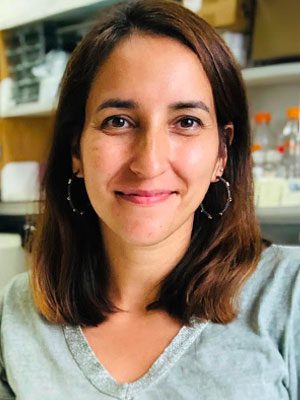Meet our new faculty:
Filipa Rijo-Ferreira

- Discipline: Infectious Diseases and Neuroscience
- Research interests: Parasitology and circadian rhythms
- Hometown: Lisbon, Portugal
- Current city: Berkeley
- Pronouns: she/her
- Hobbies: I’m an avid sailor and recent explorer of playgrounds by influence of my one-year-old twins
In January 2022, Berkeley Public Health welcomed new Assistant Professor of Infectious Diseases and Vaccinology Filipa Rijo-Ferreira. Dr. Rijo-Ferreira received her MSc in 2009 in molecular genetics and biomedicine from Imperial College, London. In 2016, she completed her PhD in basic and applied biology, molecular parasitology, and neuroscience from the University of Porto. Our staff writer, Eliza Partika, sat down to talk with Dr. Rijo-Ferreira about her work and hopes for the semester.
Where did you live and work previously?
I was born and raised in Lisbon, Portugal, and I have lived and worked in five cities so far. I graduated from the Nova University of Lisbon, where I was also awarded an MSc degree for my one-year thesis at Imperial College, London. I earned a PhD from University of Porto, a city in the north of Portugal, followed by postdoctoral training at the University of Texas Southwestern Medical Center in Dallas. Three weeks ago, I moved to Berkeley to launch my research lab and start a faculty position at Berkeley Public Health.
What are you currently working on?
I am fascinated about our day and night cycles and how organisms evolved to anticipate them. I find it incredible that parasites, such as the ones that cause malaria, show a coordinated rhythmic pattern themselves, which underlies periodic fevers in infected individuals. Our research is aimed at understanding how this phenomenon is regulated molecularly, and how we can disrupt these rhythmic patterns to offset the infection.
At BPH, we aim to set up a framework where we can explore the relationships between parasites, hosts, and the mosquitoes that serve as the vector of disease transmission, based on the time of day. We hypothesize that the circadian rhythms of these three organisms need to be aligned in order for the parasite to cause an efficient infection. In fact, when rhythms are misaligned, there is a reduction in parasite levels. Thus, identifying the molecular players from host, parasite, and mosquito is essential to understanding this phenomenon and creating alternative strategies to manage deadly infections like malaria and sleeping sickness.
What are your hopes going into the new semester at Berkeley Public Health?
I’m extremely excited to have a platform—through our research, the teaching and mentoring of students, and future collaborations with colleagues at BPH—to bring to the attention the circadian aspect of infectious diseases and bring awareness of the potential benefits of time of day vaccination and drug treatment.